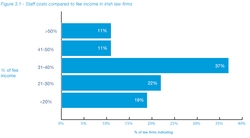|
|
Monday, 23rd February 2026 |
| Over 25 p.c. of Irish firms seek growth via M&As |
Back |
| Fee income per partner is up by over 15 per cent in over a quarter of Irish law firms in 2006, and over a quarter of Irish law firms expect their company to expand via a merger or acquisition, are some of the key statistics arising out of PricewaterhouseCoopers’ Irish Law Firm Survey 2007. Billy O’Riordan looks at the survey and examines the problems of managing growth, controlling costs, managing working capital and rewarding and developing talent. |
Law firms in Ireland face the same commercial challenges as any other business. They must actively drive and manage their growth, while continually developing their core resource - their people. They must also ensure that they are operating from a stable financial platform, one which provides finance for their day-to-day activities as well as offering an appropriate financial reward to its partners. PricewaterhouseCoopers’ Irish Law Firm Survey 2007 examines the challenges facing Irish law firms and offers some practical guidance on tackling these challenges. In order to gather this information, PricewaterhouseCoopers surveyed Irish law firms across Ireland.
Managing growth
Law firms, like all professional services firms, have benefited from the strong performance of the Irish economy over the last decade. However, this economic growth has had a number of positive impacts specific to law firms. Firstly, it increased the overall market size, as demand for professional legal services grew in line with the Irish economy. Companies who previously may never have contemplated any form of corporate transaction began to move into the complex world of acquisitions, mergers, joint ventures, private equity financing, etc.
Secondly, the increased sophistication of the market and the greater awareness of the depth of professional support that law firms can provide also facilitated growth in the sector. Firms were able to develop and expand both their range of service offerings and the industry segments or markets to which they provide these services. Against this backdrop, it is not surprising that the majority of firms participating in our survey reported strong growth and profitability in the last year (See Figure 1). | | Source: PwC |
Operating in a high-growth economy presents challenges as well as opportunities. Not least of these challenges is managing the growth of the business to ensure that it takes place in a controlled and profitable manner that provides for the long term sustainability of the firm. So, how are successful professional law firms doing this? The firms that have successfully managed growth are those that have: adopted effective business planning processes; embedded a quality client service focus into their partner and other fee-earner responsibility sets; and put the appropriate business support infrastructure in place.
Controlling the cost base
Controlling the cost base is a key challenge for all businesses, and law firms are no exception. At a very simple level the cost base of all law firms is made up of two components - staff costs - being the more significant component - and overhead expenditure.
Staff costs
In professional services firms, staff costs often amount to over one third of a firm’s fee income. This was true for the law firms surveyed, where almost 60 per cent of firms participating in our survey indicated that staff costs were 30 per cent or more of their fee income. Staff costs are difficult to control in professional firms. So, what steps can be taken to manage staff cost levels? Some of the techniques that law firms are introducing into their businesses to manage staff costs include: business case justification of incremental headcount; salary benchmarking; performance weighted remuneration packages; flexible benefit packages and outsourcing and centralisation initiatives.
Overhead expenditure
Overhead expenditure typically consists of the following cost categories: finance, business development and marketing, risk management, information technology, training, facilities, and administration. While a firm’s overhead expenditure will naturally increase as it expands and grows, it is easier to control overhead expenditure than it is to manage staff costs. Some of the techniques used to control overhead expenditure include introducing a cost control programme, capturing client costs and recharging these to the client, introducing authorisation controls for all non-chargeable expenditure and outsourcing certain aspects of a firm’s business support functions.
Managing working capital
The day-to-day operations of every law firm generate requirements for working capital - primarily its debtors and its unbilled work-in-progress. Managing working capital, and controlling the investment levels in its constituent parts, should be a priority focus for partners in every law firm. Cash flow is the lifeblood of every firm, and controlling the timing of cash in and out of the business is critical. Over half (56 per cent) of the law firms participating in the survey have a ‘lock-up’ period (the time between starting a client assignment and receiving the related payment) of more than three months. | | Source: PwC |
To improve working capital performance, partners, and other fee-earners, should be aware of - and fully understand - their working capital management responsibilities. They should have target work-in-progress and debtor investment levels. One technique that can be used to improve working capital is introducing and maintaining the practice of regular progress-billing on all accounts, but particularly during a period of high activity, and encouraging timely partner input into work-in-progress and billing queries.
Rewarding and developing talent
Most law firms recognise that their success is dependent on their people, both partners and staff. They also recognise that rewarding and developing this talent is essential to the growth and long term sustainability of their business. Over the last few years, many law firms have re-examined the way they reward and develop their professional staff. We explore some of these approaches below.
Remuneration package: In order to ensure that the rewards that they offer are competitive, law firms are actively benchmarking their salary and bonus levels against the market. In addition to the ‘cash’ element of the remuneration package most firms offer a comprehensive set of benefits to their staff - See Figure 2 below.
Flexible working arrangements: Law firms have also begun to introduce flexible working arrangements to assist employees in striking a more appropriate work-life balance, including reduced hours, non-standard day, extended maternity leave and career breaks
Training and development: To ensure that their professionals are provided with the opportunity to develop a rounded set of personal skills, and not just technical abilities, some of the leading firms offer business and management skills development programmes as well as technical training.
Coaching and mentoring: Perhaps the newest initiative in this area is the introduction of formal coaching or mentoring programmes, separate and distinct from the appraisal process. Under such an initiative, staff members are assigned a coach or mentor as they reach a certain stage in their career. This coach or mentor, typically an individual about five or six years ahead in career development terms, works with the staff member to help career development.
Performance appraisal: Early identification of talent and appropriate management and development programmes are essential to retaining the best people. This can only be reliably achieved through a robust staff appraisal system which assesses both financial and non-financial performance of staff members.
Conclusion
Overall there is much to be optimistic about for law firms in Ireland. Over the next few years however, we should see new entrants into this market from international competitiors who see Ireland as an attractive location. Therefore it is key for Irish law firms to tackle the key issues facing them - managing growth, controlling costs, managing working capital and rewarding and developing talent so that they remain competitive. |
Billy O’Riordan is an advisory partner at PricewaterhouseCoopers.
|
| Article appeared in the August 2007 issue.
|
|
|